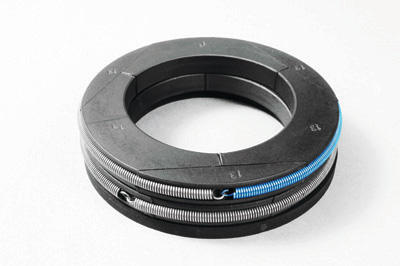The department is engaged in studying and testing of plastics and polymeric composites and in fluoroplastic technology. It is ranked among the leading institutions developing and processing fluoroplastics in the Czech Republic. METALOFLON® self-lubricating bearing foil, the most widespread Czech invention in automotive industry, was developed here. The department has implemented a quality management system according to CSN EN ISO 9001 certified by LL-C (Certification) Czech Republic s.r.o


Polymers technology:
- Tests of impact and notch toughness by Charpy, Izod methods (0.5 - 4 J) at laboratory temperature
- Creep tests at constant tensile stress at laboratory temperature and bending stress in a three-point configuration over a temperature range (23-80 ° C).
- Light microscopy, density measurement, determination of fillers (combustion test - determination of ash content), gravimetric determination of moisture content.
- Determination of Shore A, Shore D hardness and ball indentation method according to ČSN EN ISO 2039-1.
- Determination of tensile properties of plastics at laboratory temperature - modulus of elasticity, stress and deformation according to ČSN EN ISO 527.
- Thermal analysis in the temperature range of -85 ° C to 550 ° C by Differential Scanning Calorimetry (DSC) - determination of melting point and glass transition, specific melting heat, crystallinity, annealing or curing control etc.
Fluoropolymers technology:
- METALOPLAST® /METALOFLON® - self-lubricating bearing foil
- Graphite and glass fiber reinforced PTFE (teflon) foils and reinforced with metal welded metal fabric, low friction coefficient and high wear resistance, available in bands of length from 3 up to 25 m and of 300 mm width and 0.48 ± 0.02 mm or 0.78 ± 0 , 02,02 mm thickness.
Activities of the department in the field of surface treatment evaluation:
- Fog tests of neutral sodium chloride solution according to ČSN EN ISO 9227
- Surface roughness measurement (range 350 μm, max. Sensing path 17.5 mm) - determination of Ra, Rz, Rq, Rmax, etc.
- Determination of coating thickness on ferrous and non-ferrous metal substrates
Foil thickness 0.48 ± 0.02 mm
- MP-2 (SP-25) with welded tin bronze mesh for loose bearings
- MP-2L (SP-25L) with welded tin bronze mesh for bonded bearings with surface prepared for sticking
- MP-3 (SP-25N) with stainless steel mesh
- MP-3L (SP-25NL) with tin stainless steel mesh for bonded bearings with surface prepared for sticking
Note: In parentheses, the earlier designation is given.
Foil thickness 0.78 ± 0.02 mm
- MP-4 with welded tin bronze mesh for loose bearings
- MP-4L with welded tin bronze mesh for bonded bearings with surface prepared for sticking
- MP-S78 with stainless steel fabric
- MP-S78T with stainless steel fabric for bonded bearing cases
- Slide plates for moving bridge constructions and expansion joints with METALOPLAST® sliding layer and steel and hard rubber washer
- Molded and machined parts of unpacked and filled PTFE and fluorinated copolymers
- Piston rings, sealing rings and PTFE filled gaskets for compressors and fittings
- Composite PTFE-based pans for ball bearings for the automotive industry
- PTFE and modified PTFE (Teflon) Xylan coatings for anti-adhesion, sliding and electro-insulating purposes up to 1 x 0.8 x 0.8 m
- Coating materials and metal parts Xylan-type fluoroplasts Dip-Spin Coating for anti-corrosion and sliding treatment
- Non-electroplated coatings with DELTA-MKS® zinc micropellers and other systems such as anticorrosive treatment of fasteners, springs and small metal parts, including sealing topcoats, especially Dip-Spin Coating (eg Dörken MKS - Systeme GmbH & Co. KG), automotive. Basecoat based on zinc microlamel creates cathodic protection together with topcoat based on curable plastics or PTFE addition with total corrosion resistance in salt mist test according to DIN 50021 from 480 to 1000 h. It is a suitable surface treatment of strength bolts and elastic elements without the danger of hydrogen bleeding
Contact:
Head of department - Ing. Jakub Melichar, Ph.D
Mobile: +420 702 280 440
E-mail: melichar@svum.cz



